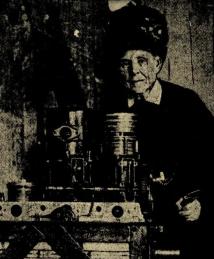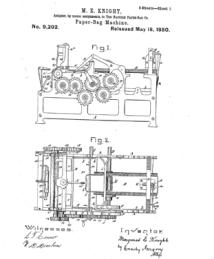Margaret E. Knight
Margaret Knight invented a machine that could automatically cut, fold and glue flat-bottomed paper bags. Her revolutionary invention enabled the mass production of paper bags by performing the work of 30 people with one machine.
Born in York, Maine, in 1838, Knight enjoyed working with her hands from an early age. As a child, she made toys for her brothers and became well known around town for the impressive kites and sleds she constructed by hand.
Knight attended school until age 12, when her life changed drastically after her father suddenly died. Her family moved to New Hampshire, where she began working long hours in a textile mill to help her mother maintain financial stability.
Textile mills were considerably dangerous due to their poor working conditions and lack of safety standards, and it wasn’t long before Knight witnessed a serious accident caused by a malfunctioning loom. A leading cause of injuries at the mill involved the steel-tipped shuttles used in the weaving process coming free from the looms and flying out at high speeds. A desire to help led Knight to develop her first invention, a shuttle restraint system designed to prevent worker injuries.
By the time Knight was a teenager, her safety device had become a standard fixture on looms across the country. Unfortunately, at such a young age, she was unaware of the patent system and did not receive any compensation for this invention. As time went on, however, Knight realized the monetary potential of her work and she would later fight for her creative rights.
After working a series of technical jobs and learning a number of trades, in 1867, Knight began working at the Columbia Paper Bag Co. in Springfield, Massachusetts. Similar to her experience at the textile mill, she realized the company’s processes could be improved. Rather than folding each paper bag by hand, she wondered if she could devise a way to automate the bag-making process. Soon, “she began to experiment with a machine that could feed, cut, and fold the paper automatically and, most importantly, form the squared bottom of the bag.”
Just one year later, in 1868, Knight’s machine was fully operational and had significantly improved both the company’s output and the uniformity of its paper bags. Before the use of her machine, most paper bags were V-shaped paper cones that functioned more like envelopes. Flat-bottomed bags, which were much easier to use, could only be made manually and at great expense. Thanks to Knight’s invention, it was now possible to mass manufacture the flat-bottomed bags we still use today to carry groceries or pack lunches.
Recalling her experience with the shuttle restraint system, Knight knew she needed to apply for a patent on her paper bag machine. However, she faced an unexpected challenge as Charles Annan, a man who worked in the machine shop that manufactured it, attempted to steal her design.
In court, Annan made the sexist claim that as a woman, Knight “could not possibly understand the mechanical complexities of the machine.” Knight quickly disproved his argument by providing the original blueprints of the machine’s design. She soundly won the case and received a patent on her invention in 1871.
With the rights to her machine secured, Knight co-founded the Eastern Paper Bag Co. in Hartford, Connecticut. She continued to invent throughout her life, and by the time she passed away in 1914, she had patented at least 26 inventions, ranging from a window frame to a sole-cutting machine for shoemaking, to a compound rotary engine. Her story, demonstrating extraordinary ingenuity and persistence, continues to inspire generations.

